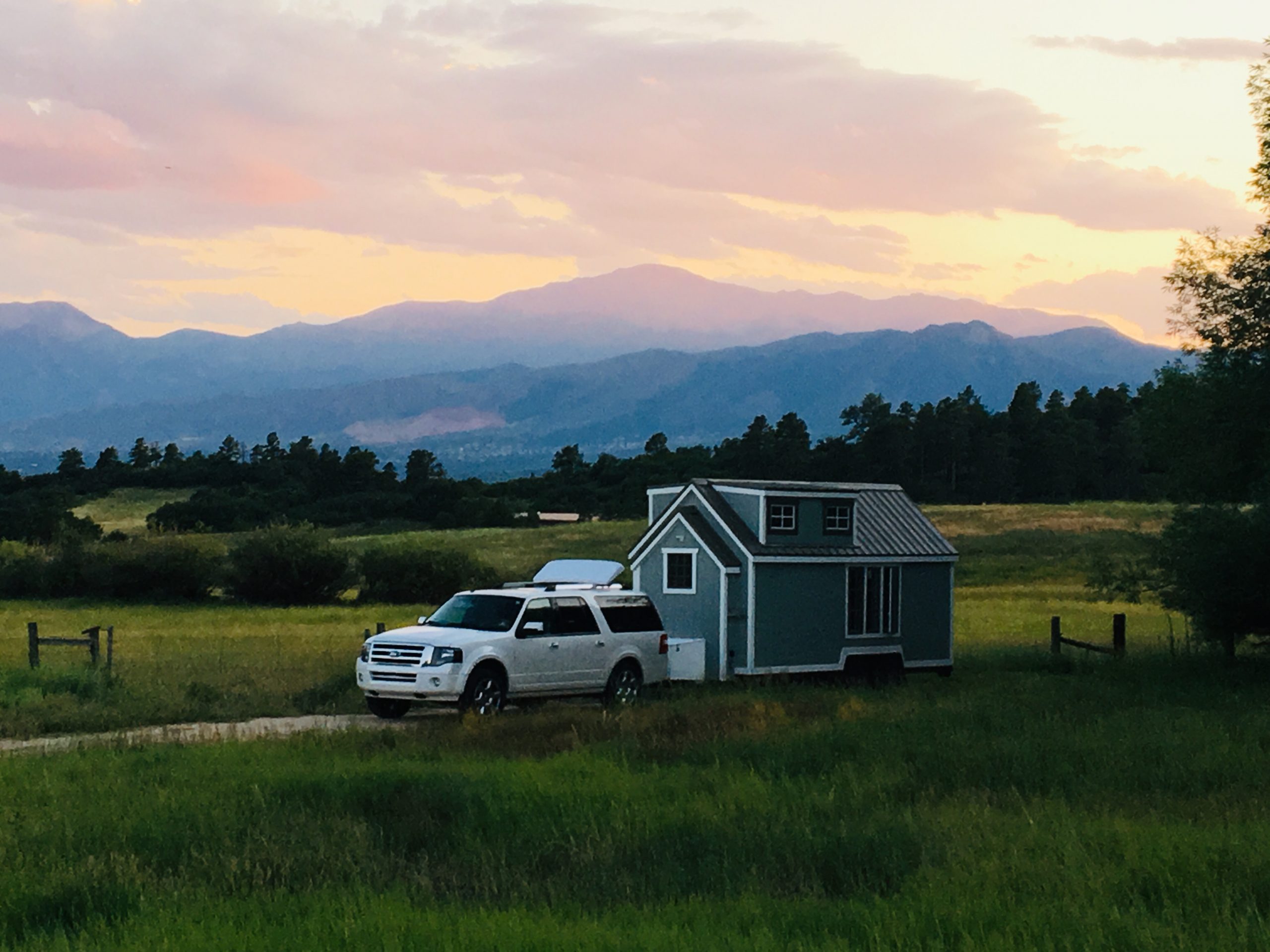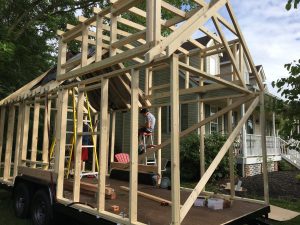The Sabbatical and the Tiny House

 The church where I pastor was kind enough to release me for a 15-week sabbatical over the course of this past year. The idea behind a sabbatical comes from the Old Testament where God ordained that the land and people should have a time of rest. For me, the sabbatical not only provided that time of rest, but it allowed me to push reset on my weekly duties, routines, and emotions. Looking back, I realize that I was unable to do that without an interruption to my week to week ministry. As pastors, it’s easy to feel this way. For no sooner than we utter Sunday’s final Amen, then the hourglass flips and we’re on the clock for the next weekend.
The church where I pastor was kind enough to release me for a 15-week sabbatical over the course of this past year. The idea behind a sabbatical comes from the Old Testament where God ordained that the land and people should have a time of rest. For me, the sabbatical not only provided that time of rest, but it allowed me to push reset on my weekly duties, routines, and emotions. Looking back, I realize that I was unable to do that without an interruption to my week to week ministry. As pastors, it’s easy to feel this way. For no sooner than we utter Sunday’s final Amen, then the hourglass flips and we’re on the clock for the next weekend.
Sooner or later, all pastors have heard the joke that they only work one day a week. But the truth is that your public work on Sunday is preceded by a never-ending week of ministry duties, mental routines, and pastoral emotions. Over time, the friction of those three elements rubbing together can begin to wear down each of them—your duties, routines and emotions. Without being consciously aware of it, I was beginning to lose the joy of helping others carry their burdens—a unique privilege of the pastoral call (Gal 6:2). I wouldn’t say I was burning out, but I do believe I was thinning out. Bilbo Baggins words described me: I feel thin, like butter scraped over too much bread. If you are involved in ministry and those words resonate with you, a sabbatical would be beneficial. I had no idea, how that time away would restore my desire to be a joyful-burden-bearer.
Try Something Completely Different
One of our elders encouraged me to do something entirely different during my time away from ministry responsibilities. His father, as a pastor had maintained this practice throughout numerous sabbaticals, and it had extended his ministry. So, as I stepped away from all the work I typically did with my mind (Sunday preparation, teaching, counseling, and writing) I was looking for something I could do with my hands. I wanted to come away from the sabbatical with a project completed. Frankly, I wanted to build something. As I prayed and wrestled with this desire, a really crazy idea began to materialize. I began to study Tiny Houses and wondered if I could build one and travel in it during the course of my sabbatical (I told you it was a really crazy idea). I was drawn to minimalistic living, practicing simplicity and doing all of it with my family.
 The trailer base arrived the first week of June and we were off to the races. With the help of some friends a house began to appear on the 18-foot trailer. Thirty-five days later, on July 7th, we hitched our Expedition up to our tiny house on wheels and headed west—an adventure that would last for 40 days. While I would not recommend this type of sabbatical for everyone, here’s a few ways it was restorative for me personally.
The trailer base arrived the first week of June and we were off to the races. With the help of some friends a house began to appear on the 18-foot trailer. Thirty-five days later, on July 7th, we hitched our Expedition up to our tiny house on wheels and headed west—an adventure that would last for 40 days. While I would not recommend this type of sabbatical for everyone, here’s a few ways it was restorative for me personally.
I had to depend on others.
My church family helped me with some of the purchases and gifted their labor and expertise into the project or I would not have been able to complete it. They gave up back-to-back weekends, labored through hot Jersey summer days, and did it all with a joy that convicted me. I started to ask myself good questions: Was I serving them with the kind of energy and joy with which they were serving me? Was I discovering that joy in ministry through a team effort? There’s something energizing about working shoulder to shoulder with other men and completing the project. At its completion, one of my friends commented, “A lot of hands have touched that house.” He was right. It’s a good thing when we need the help of others.
I had to work hard.
When you’ve been behind a desk for a few decades, muscles atrophy. Even if you exercise routinely, it’s not the same as laboring in the hot sun for 15-hour days. In the beginning I felt my weakness, but by the end I was finding my strength. I dropped 15 pounds and felt my energy level rising. Pain that I’d experienced in my hands prior to the sabbatical, dissipated. When you’ve physically spent yourself, sleep comes quickly. In some way, the physical activity was restorative to my mental and emotional capacities. I was able to think more clearly, and I began to rediscover the joy I had in helping others. While I labored for those 35 days, completely removed from ministry, there was another transition taking place. The complete transition to physical labor, allowed me to close ministry chapters that I’d been carrying around in my head for years. The closing of those chapters allowed me to begin to dream about the new chapters that God might pen in my life and in the life of my flock.
I had to walk by faith.
 Building a house (even if it’s tiny) in 35 days isn’t the way most would plan to rest (I told you it was a really crazy idea). Many said it couldn’t be done in time to travel west, and I had to come to grips with the fact that it probably wouldn’t – unless God would intervene. I’ve never known a building project that didn’t take more time and money than estimated, and this one wasn’t the exception. There were setbacks to the schedule, and then God would send someone to help. There were cost overruns, and then God would provide the funds. Augustine said, “Pray as if it all depends on God, and work as if it all depends on you.” Certainly, there was a plan (sort of), but I had to walk by faith throughout the process. It occurred to me that building the tiny house was a microcosm of our lives. We can certainly work hard, but ultimately, we’ll need to depend upon the Lord to live life well. It’s good to be reminded that we need to walk by faith—and that’s necessary whether your project is big or tiny.
Building a house (even if it’s tiny) in 35 days isn’t the way most would plan to rest (I told you it was a really crazy idea). Many said it couldn’t be done in time to travel west, and I had to come to grips with the fact that it probably wouldn’t – unless God would intervene. I’ve never known a building project that didn’t take more time and money than estimated, and this one wasn’t the exception. There were setbacks to the schedule, and then God would send someone to help. There were cost overruns, and then God would provide the funds. Augustine said, “Pray as if it all depends on God, and work as if it all depends on you.” Certainly, there was a plan (sort of), but I had to walk by faith throughout the process. It occurred to me that building the tiny house was a microcosm of our lives. We can certainly work hard, but ultimately, we’ll need to depend upon the Lord to live life well. It’s good to be reminded that we need to walk by faith—and that’s necessary whether your project is big or tiny.
PHIL MOSER is the author of the Biblical Strategies series and the developer of 4M Training: a 13-week small group study for men. All of his resources can be found on amazon or at biblicalstrategies.com.
If you’re looking for a resource for your men’s group, consider 4M Training. Mature, master, minister, and mentor in 13 weeks. Click on image below to learn more.


